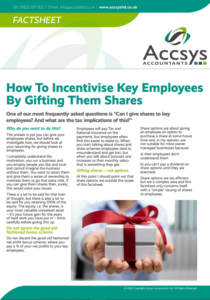How To Incentivise Key Employees By Gifting Them Shares

One of our most frequently asked questions is “Can I give shares to key employees? And what are the tax implications of this?”
Why do you want to do this?
The answer is yes you can give your employees shares, but before we investigate how, we should look at your reasoning for giving shares to employees.
I completely understand the motivation, you run a business and you employ people you like and trust and cannot imagine the business without them. You want to retain them and give them a sense of ownership to motivate them to go that extra mile. If you can give them shares then, surely, this would solve your issues.
There is a lot to be said for that train of thought, but there is also a lot to be said for you retaining 100% of the equity. The equity, i.e. the shares, is your most valuable unrealised asset – it’s your future gain for the years of hard work you have put in – think carefully before giving this up.
Do not ignore the good old-fashioned bonus scheme
Do not discard the good old-fashioned net profit bonus scheme, where you pay a % of your net profits to your key employees.
Employees will pay Tax and National insurance on the payments, but employees often find this easier to relate to. When you start talking about shares and share schemes employees tend to misunderstand and get lost, but when you talk about bonuses and increases to their monthly salary that is something they get.
Gifting shares – not options
At this point I should point out that share options are outside the scope of this factsheet.
Share options are about giving an employee an option to purchase a share at some future time and, in my opinion, are not suitable for most owner managed businesses because:
a) their employees don’t understand them
b) you can’t pay a dividend on share options until they are exercised.
Share options are tax efficient but are a complex area and this factsheet only concerns itself with a “simple” issuing of shares to employees.
Gifting Shares
This factsheet covers the gifting of shares to key employees.
You can gift any class of shares to your new employee (A Shares, B Shares or C Shares) but if you want to pay a dividend on them in the future then they should be full voting shares. Any gift of shares will dilute the % you own.
The shares you issue will have to have a value placed on them and this means a valuation of the business, which needs to be agreed with HMRC. There is a cost of this valuation – expect to pay between £1,000 – £2,000.
The gift of these shares will incur an income tax charge on the employee based on the valuation of the business. If the shares are worth £1,000, the employee will pay Tax and National Insurance at their rate of tax.
If you do not want your employee to bear the cost of the tax you can issue them a bonus to cover the cost.
Finally, you will need a shareholder’s agreement that covers things such as good and bad leavers, drag and tag along rights and the ultimate sale of the business. Expect to pay between £1,000 – £2,000 for this.
The cost of this is adding up to be between £2,000 – £4,000 + VAT plus the income tax on the value of shares gifted.
Hurdle Shares
One way to avoid paying the income tax charge is to issue Hurdle or Growth Shares.
Hurdle or Growth shares are a way of issuing shares that have little or no value today but will become valuable with the future growth of the company.
This future growth can be set and is a hurdle that the business needs to overcome for the underlying value of the shares to rise.
For example, the value of the business must reach a certain % more than it is on issue of the shares for the shares to be worth anything.
Because the value of the share is low when they are issued then the income tax on issue is low.
The business still needs a valuation and a shareholder’s agreement will be required.
Dividends can be paid on Hurdle or Growth shares and capital gains tax is only payable when the shares are disposed of. Dividends can be paid from day one, but this could increase their value in the eyes of HRMC on issue so care has to be taken.
If you are thinking of incentivising your employees with a share scheme, please call to discuss your individual circumstances.


